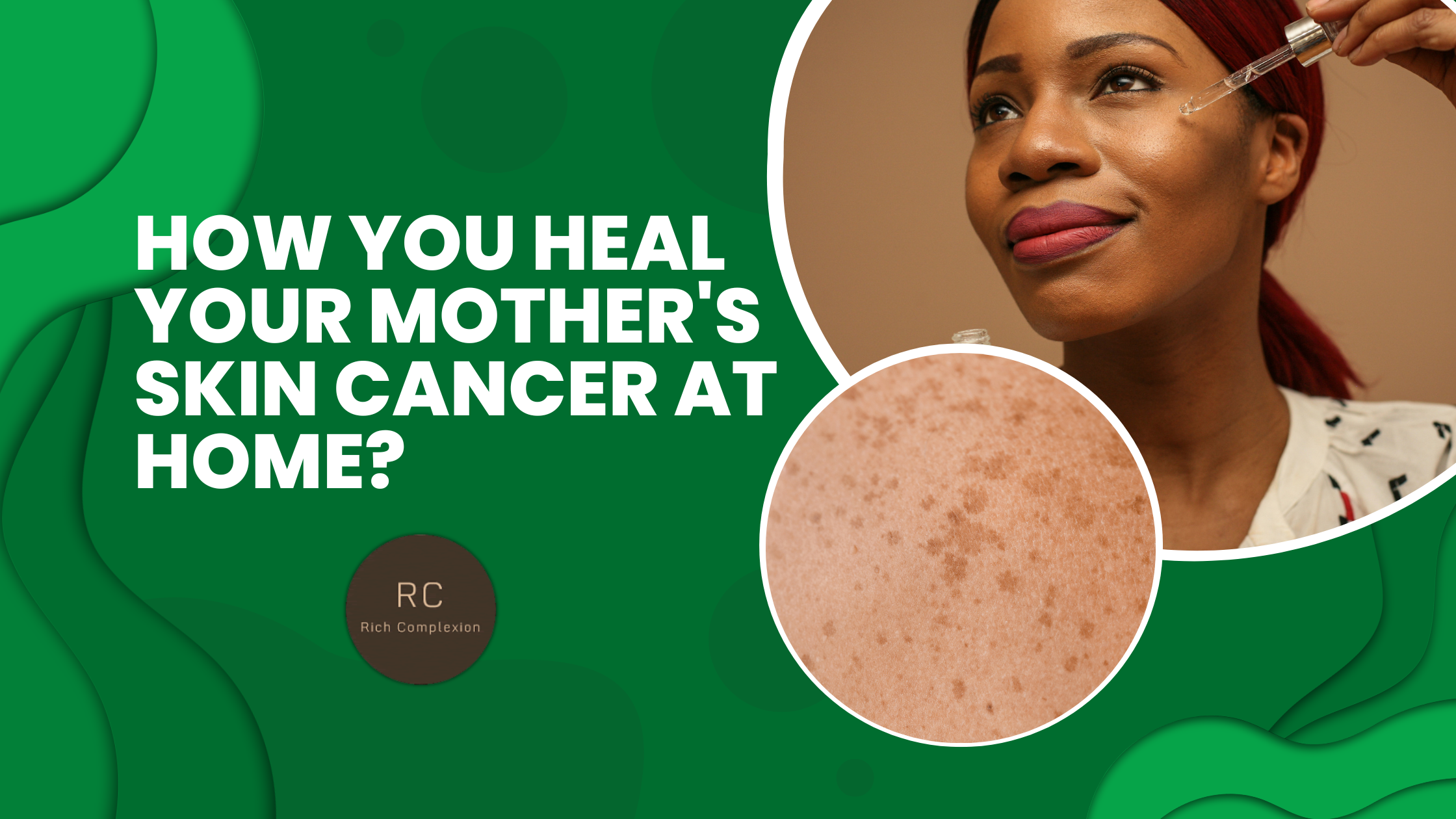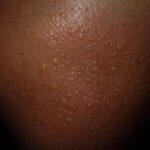The clock is ticking. Your mother has been diagnosed with skin cancer, and the doctors say she needs surgery. But you’re not willing to give up hope. You’ve heard about home remedies that can help heal skin cancer, and you’re determined to try them.
You start by researching the different options available. You read about apple cider vinegar, green tea, and turmeric. Again, you talk to other people who have tried home remedies for skin cancer. And you finally come up with a plan.
Consequently, you’re going to start by applying apple cider vinegar to the affected area. You’ll also drink green tea and take turmeric supplements. And you’re going to make some changes to your diet, eating more fruits and vegetables.
However, you know it’s a long shot, but you are willing to do whatever it takes to save your mother’s life. So, let’s bring all your thoughts into this article.
Why Skin Cancer Happens?
Skin cancer happens when the DNA of skin cells is damaged and the cells start to grow out of control. This can be caused by exposure to ultraviolet (UV) radiation from the sun or from artificial sources like tanning beds.
UV radiation damages the DNA of skin cells by causing breaks in the DNA strands. These breaks can lead to mutations, which are changes in the DNA that can make the cells grow out of control.
The more UV radiation exposure a person has, the higher their risk of developing skin cancer. This is why people with fair skin, who are more sensitive to UV radiation, are at higher risk of skin cancer than people with darker skin.
Other factors that can increase the risk of skin cancer include:
Ultraviolet (UV) radiation
The most significant risk factor for skin cancer is exposure to UV radiation, either from the sun or tanning beds. UV radiation damages the DNA in skin cells, and over time, this damage can accumulate, leading to abnormal cell growth and cancer.
Fair skin and light hair color
People with fair skin, light-colored hair, and light-colored eyes are at higher risk of developing skin cancer because their skin has less melanin, which provides some protection against UV radiation.
Family history
If you have a family history of skin cancer, especially melanoma, your risk may be higher due to inherited genetic factors.
Age
The risk of skin cancer increases with age since the cumulative effect of UV exposure takes years to manifest.
Moles
Large numbers of moles or certain types of atypical moles (dysplastic nevi) can increase the risk of melanoma.
Weakened immune system
People with a weakened immune system, such as organ transplant recipients or those with certain medical conditions, are more susceptible to skin cancer.
Exposure to certain chemicals
Some chemicals, such as arsenic and certain industrial substances, have been associated with an increased risk of skin cancer.
Previous skin cancer
If you have had skin cancer in the past, you are at higher risk of developing it again.
Radiation exposure
Previous exposure to radiation, such as in cancer treatments, can increase the risk of skin cancer in the exposed area.
What Is The Best Home Remedy For Skin Cancer?
When it comes to skin cancer, there is no one-size-fits-all cure that can be found in your pantry. However, some home remedies have shown promise as complementary treatments alongside medical interventions. One such remedy is aloe vera, known for its soothing properties. This natural gel extracted from the leaves of the aloe plant contains antioxidants and anti-inflammatory compounds that may help reduce inflammation and promote healing in skin affected by cancer.
Another potential home remedy for skin cancer is green tea. Packed with polyphenols, green tea has been studied for its potential to inhibit the growth of cancer cells and prevent their spread. Applying cooled green tea bags topically or consuming green tea regularly may provide some protection against further damage caused by harmful UV rays.
While these home remedies show promise, it’s important to note that they should not replace proper medical treatment for skin cancer. It’s crucial to consult with a dermatologist or healthcare professional before attempting any alternative therapies. Skin cancer can be a serious condition that requires prompt medical attention, so early detection and professional guidance remain paramount in ensuring effective treatment outcomes.
Is There A Natural Way To Fight Skin Cancer?
As the rates of skin cancer continue to rise, many individuals are seeking natural alternatives to fight this deadly disease. Although there is no definitive cure for skin cancer, certain natural ingredients have shown promise in preventing its progression or alleviating symptoms. One such ingredient is green tea extract, which contains numerous antioxidants that can help protect against UV radiation damage and reduce inflammation. Additionally, several studies have indicated that curcumin, a compound found in turmeric, may possess anti-cancer properties and could potentially inhibit the growth of skin cancer cells.
Furthermore, incorporating a healthy diet rich in fruits and vegetables may also play a crucial role in fighting against skin cancer naturally. Certain fruits such as blueberries and strawberries contain high levels of antioxidants called anthocyanins that can help neutralize free radicals caused by sun exposure. Moreover, leafy green vegetables like spinach and kale are packed with vitamins A, C, and E – all of which contribute to a healthy immune system and can support the body’s defense mechanisms against cancerous cells.
While natural remedies should never replace medical treatments prescribed by healthcare professionals when it comes to skin cancer management or prevention strategies – they may serve as complementary options alongside traditional medical interventions. By exploring these natural approaches and discussing them with a dermatologist or oncologist knowledgeable about integrative medicine protocols; individuals have the opportunity to enhance their overall well-being while combating this prevalent disease more effectively.
How You Heal Your Mother’s Skin Cancer at Home- The Diagnosis and Natural Treatment Methods
It’s important to emphasize that skin cancer is a serious condition that requires medical attention and professional treatment. Natural remedies may complement medical treatments, but they should never replace them. Always consult with a qualified healthcare professional before trying any alternative therapies.
That being said, here are some natural remedies that are often used to support overall skin health and may have some potential benefits for those dealing with skin cancer at home.
Aloe Vera
Aloe vera has soothing properties and may help with skin irritation caused by radiation therapy or other cancer treatments.
Turmeric
Curcumin, the active compound in turmeric, has anti-inflammatory properties and potential anticancer effects. It may be helpful when incorporated into a balanced diet.
Green Tea
Green tea contains antioxidants that might offer some protective benefits for the skin.
Vitamin D
Adequate vitamin D levels may be associated with a reduced risk of some cancers. However, it’s essential to talk to your doctor about proper supplementation, as excessive vitamin D intake can be harmful.
Healthy diet
A diet rich in fruits, vegetables, whole grains, and lean proteins may support overall health and immune function.
Stress management
Chronic stress can negatively impact the immune system. Practicing relaxation techniques like meditation, yoga, or deep breathing may be beneficial.
Mind-body therapies
Some people find benefit in mind-body therapies like acupuncture or mindfulness-based stress reduction, which may help reduce stress and improve well-being.
Frequently Asked Questions ( FAQs)
1. Question: Can skin cancer be treated at home?
Answer: Skin cancer should be treated by healthcare professionals, such as dermatologists or oncologists. Home remedies are not a substitute for medical treatment, and delaying proper care can lead to serious consequences.
2. Question: What are the symptoms of skin cancer?
Answer: Skin cancer can present itself in various forms, such as changes in moles or spots, new growths, sores that don’t heal, or changes in the appearance of the skin. If you notice any suspicious changes on your mother’s skin, it’s crucial to have it evaluated by a medical professional.
3. Question: Are there any natural remedies for skin cancer?
Answer: While some home remedies or natural products may have anecdotal evidence of benefits for general skin health, there is no scientific evidence to suggest that any home remedy can effectively treat skin cancer.
4. Question: Can a healthy diet cure skin cancer?
Answer: Eating a balanced and healthy diet is essential for overall well-being, but there is no specific diet that can cure skin cancer. Medical treatments, such as surgery, radiation, chemotherapy, or targeted therapies, are the most effective options for treating skin cancer.
5. Question: Can certain supplements help with skin cancer?
Answer: There is no scientific evidence to suggest that supplements can cure skin cancer. In some cases, certain supplements may even interfere with medical treatments, so it’s crucial to consult with a healthcare professional before using any supplements.
6. Question: Are there any alternative therapies that work for skin cancer?
Answer: Some individuals explore alternative therapies alongside conventional treatments. However, the effectiveness of alternative therapies varies, and some may even be harmful. It’s crucial to discuss any alternative therapies with a healthcare professional to ensure they are safe and won’t interfere with standard medical treatments.
7. Question: What should I do if I suspect my mother has skin cancer?
Answer: If you suspect your mother may have skin cancer or notice any concerning changes on her skin, encourage her to see a healthcare professional immediately. Early detection and treatment significantly improve the chances of successful outcomes.
How Long Does It Take to Heal Skin Cancer at Home?
The healing time for skin cancer can vary greatly depending on several factors, including the type and stage of cancer, the treatment method used, and the individual’s overall health. In some cases, certain types of skin cancer may be treated effectively at home with topical ointments or creams. These treatments typically aim to destroy or remove the abnormal cells on the skin’s surface. However, it is important to note that home remedies should always be approached with caution and under the guidance of a healthcare professional.
While it is possible to treat superficial forms of skin cancer at home, more severe cases will likely require medical intervention such as surgery or radiation therapy. These treatments can take longer to heal as they involve invasive procedures that target not only the surface but also deeper layers of tissue affected by cancer cells. It is essential for individuals to consult with a dermatologist or oncologist who can evaluate their specific condition and create an appropriate treatment plan tailored to their needs.
Ringing the Bell
In conclusion, while it is important to consult with medical professionals for the treatment of skin cancer, there are some home remedies that can be incorporated into a comprehensive care plan. These include maintaining a healthy diet rich in fruits and vegetables, using natural remedies such as aloe vera and turmeric, protecting the skin from sun damage, and practicing stress-reducing activities.
However, it is crucial to remember that these home remedies should never replace medical advice or treatment. Always consult with a healthcare provider for the best course of action for your mother’s specific condition. With proper care and attention, you can help support your mother’s healing journey and well-being.



